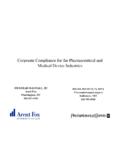Transcription of Module 6: FORMULATION OF RESEARCH OBJECTIVES
1 Module 6: FORMULATION OF RESEARCH OBJECTIVES Flowchart: Steps in the development of a health systems RESEARCH proposal NB: Development of a RESEARCH process is a cyclical process. The double-headed arrows indicate that the process is never linear. Module 6: FORMULATION OF RESEARCH OBJECTIVES OBJECTIVES At the end of this session you should be able to: 1. State the reasons for writing OBJECTIVES for your RESEARCH project. 2. Define and describe the difference between general and specific OBJECTIVES . 3. Define the characteristics of RESEARCH OBJECTIVES . 4. Prepare RESEARCH OBJECTIVES in an appropriate format for the project you are developing. 5. Develop further RESEARCH questions, and RESEARCH hypotheses, if appropriate for your study. 1. OBJECTIVES 2. Hypotheses 3.
2 Title of the study I. RESEARCH OBJECTIVES The OBJECTIVES of a RESEARCH project summarise what is to be achieved by the study. OBJECTIVES should be closely related to the statement of the problem. For example, if the problem identified is low utilisation of child welfare clinics, the general objective of the study could be to identify the reasons for this low utilisation, in order to find solutions. The general objective of a study states what researchers expect to achieve by the study in general terms. It is possible (and advisable) to break down a general objective into smaller, logically connected parts. These are normally referred to as specific OBJECTIVES . Specific OBJECTIVES should systematically address the various aspects of the problem as defined under Statement of the Problem ( Module 4) and the key factors that are assumed to influence or cause the problem.
3 They should specify what you will do in your study, where and for what purpose. A study into the cost and quality of home-based care for HIV/AIDS patients and their communities in Zimbabwe, developed at an HSR workshop, for example, had as its general objective: To explore to what extent community home-based care (CHBC) projects in Zimbabwe provide adequate, affordable and sustainable care of good quality to people with HIV/AIDS, and to identify ways in which these services can be improved. It was split up in the following specific OBJECTIVES : 1. To identify the full range of economic, psychosocial, health/nursing care and other needs of patients and their families affected by AIDS. 2. To determine the extent to which formal and informal support systems address these needs from the viewpoint of service providers as well as patients.
4 3. To determine the economic costs of CHBC to the patient and family as well as to the formal CHBC programmes themselves. 4. To relate the calculated costs to the quality of care provided to the patient by the family and to the family/patient by the CHBC programme. 5. To determine how improved CHBC and informal support networks can contribute to the needs of persons with AIDS and other chronically and terminally ill patients. 6. To use the findings to make recommendations on the improvement of CHBC to home care providers, donors and other concerned organisations, including government. The first specific objective usually focuses on quantifying or specifying the problem. This is necessary in many studies, especially when a problem has been defined (but not quantified) for which subsequently the major causes have to be identified.
5 Often use can be made of available statistics or of the health information system. In the study on the high defaulter rate of TB patients, this rate should first be established, using the records, and only then would the contributing factors to defaulting be analysed. In the example given, the needs of AIDS patients and their relatives for care and support have been defined in the first objective. The OBJECTIVES which follow concentrate on adequacy, cost and quality of care provided whereas the last two OBJECTIVES specify possible improvements with respect to CHBC, and to whom the results and recommendations of the study will be fed back. Note: It may be helpful to use the diagram as a point of departure and check whether the problem and all major, directly contributing factors (analytic study) or major components (descriptive or evaluation study) have been covered by the OBJECTIVES .
6 An objective indicating how the results will be used should be included in every operational study, either as part of the general objective or as a specific objective. Why should RESEARCH OBJECTIVES be developed? The FORMULATION of OBJECTIVES will help you to: Focus the study (narrowing it down to essentials); Avoid the collection of data which are not strictly necessary for understanding and solving the problem you have identified; and Organise the study in clearly defined parts or phases. Properly formulated, specific OBJECTIVES will facilitate the development of your RESEARCH methodology and will help to orient the collection, analysis, interpretation and utilisation of data. How should you state your OBJECTIVES ? Take care that the OBJECTIVES of your study: Cover the different aspects of the problem and its contributing factors in a coherent way and in a logical sequence; Are clearly phrased in operational terms, specifying exactly what you are going to do, where, and for what purpose; Are realistic considering local conditions; and Use action verbs that are specific enough to be evaluated.
7 Examples of action verbs are: to determine, to compare, to verify, to calculate, to describe, and to establish. Avoid the use of vague non-action verbs such as: to appreciate, to understand, or to study. Keep in mind that when the project is evaluated, the results will be compared to the OBJECTIVES . If the OBJECTIVES have not been spelled out clearly, the project cannot be evaluated. Using the previous example on cost and quality of CHBC, we may develop more specific RESEARCH questions for the different OBJECTIVES , such as: Do rural and urban CHBC projects differ with respect to the adequacy, quality, affordability and sustainability of HBC provided? How satisfied are AIDS patients, relatives and service providers with the care provided? Are there differences in perceptions between those groups?
8 Is the stigma attached to being HIV+ the same strong for women as for men? Or are there gender differences in stigma? What impact does the care provided to AIDS patients have on the economy of the homestead? Is there competition with other basic needs ( schooling of children, purchases of food)? II. HYPOTHESES Based on your experience with the study problem, it might be possible to develop explanations for the problem, which can then be tested. If so, you can formulate hypotheses in addition to the study OBJECTIVES . A HYPOTHESIS is a prediction of a relationship between one or more factors and the problem under study that can be tested. In our example concerning the cost and quality of HBC in Zimbabwe it would have been possible to formulate and test the following hypotheses: 1.
9 The role of first-line relatives in the provision of care to AIDS patients is more substantial in rural than in urban areas. 2. The silence and stigma surrounding AIDS makes the formation of self-help groups of AIDS patients and their relatives next to impossible, which in turn maintains the high level of stigma on HIV/AIDS. Note: Policy makers and field staff usually feel the need for RESEARCH because they do NOT have enough insight into the causes of a certain problem. Therefore, most HSR proposals present the specific OBJECTIVES in the form of open statements (as given in the examples earlier) instead of focusing the study on a limited number of hypotheses. III. TITLE OF THE STUDY Now you can finalise the title of your study. The title should be in line with your general objective.
10 Make sure that it is specific enough to tell the reader what your study is about and where it will be calculated. NOT: A study on community home-based care BUT: A study on cost and quality of community home-based care for HIV/AIDS patients and their communities in Zimbabwe You might also consider fancier titles: Do We Care? A study on cost and quality of CHBC for HIV/AIDS patients in Zimbabwe * Another example could be: WORKSHOPS: Blessings or Burdens? A study of the workshops held in 1999 in Province Y - Their utility and consequences for daily working activities of health staff *The study with this title, used as an example in the present Module , was carried out by G Woelk, H Jackson, R Kerkhoven, K Hansen, N Manjonjori, P Maramba, J Mutambirwa, E Ndimande and E Vera.



